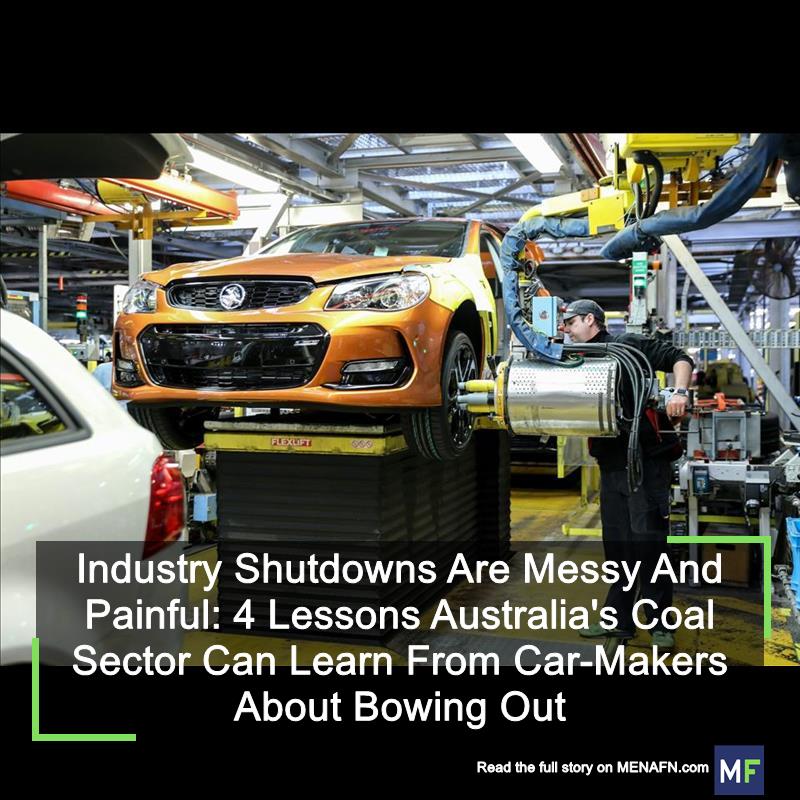
Industry Shutdowns Are Messy And Painful: 4 Lessons Australia's Coal Sector Can Learn From Car-Makers About Bowing Out
People and economies are often deeply connected to the coal industry. Coal plants have often been integral to a community for decades, and closing them is a complex social process.
So how do we minimise the social and economic effects of such closures, and ensure communities and regions continue to thrive?
To answer this question, we looked to another sector that's recently undergone large-scale shutdowns: Australia's car-making industry. Our research highlights four lessons to help plan the end of the coal-fired power sector.
People and economies are often deeply connected to coal plants. Dan Himbrechts/AAP The huge loss of the car industry
Australia's coal plants are polluting, ageing and inefficient. Closing them sooner rather than later makes sense.
But the shift is challenging. First, renewable energy must be scaled up to cover the loss of coal-fired power. Second, poorly managed closures can lead to widespread social and economic disruption.
For guidance, we can look to closures in the Australian car industry in recent decades, mostly in South Australia and Victoria. The closures were due to economic and policy shifts which made the domestic industry untenable.
The last closure occurred in October 2017, when Holden shut down its Elizabeth plant after 70 years of operations. The move led to mass job losses . It also disrupted community and social cohesion , leading to family breakdowns and social and health issues among workers.
Read more: What is a 'just' transition to net zero - and why is Australia struggling to get there?
Holden shut its Elizabeth plant in 2017. Holden Lessons for coal plant closures
Holden's closure process was not perfect. Research showed three years after the Elizabeth plant closed, many workers remained financially vulnerable. And while workers were helped into new employment as quickly as possible, this often came at the expense of quality employment, and did not meet the demand for new skills to align with emerging industries.
The Holden experience nonetheless offers lessons for the coal-fired power industry.
Both industries are male-dominated and involve a high proportion of blue-collar workers with low levels of formal education and skills training. Plants are often located in communities dominated by single-income households. The industries are a source of pride for locals and form a major part of people's social and cultural identity, often across generations.
In our research , we spoke with people from various groups involved in Holden's closure process. These included the car industry and its supply chain, agencies across all levels of government, community organisations and academia.
Our research highlights four standout lessons:
1. Timing matters
The Elizabeth plant closure was a gradual process that unfolded over several years. This extended timeline allowed most workers, families and businesses to be prepared – as well as they could be – for imminent restructuring.
Holden planned a staged release of workers over three years. This prompted local and state agencies to coordinate resources, and helped workers and their families plan for the transition without experiencing immediate pressure on their social and economic wellbeing.
2. Try innovative solutions
Holden's“transition centre”, established in 2014, was a one-stop shop where employees could access a range of services and information. A local government representative told us the transition centre:
With the mental health of the workers and their families in mind, for example, the centre provided information about healthy eating and exercising. However, the centre wasn't always on the cards. As one interviewee observed:
Holden's 'transition centre' provided employees with a range of services and information. Daniel Mariuz/AAP
3. Consider families, too
When longstanding industries close, the impact is felt beyond the worker. It changes family dynamics and poses risks to mental health. It also demands new skills such as financial literacy amongst redundant workers and families so they can better manage payouts and future investments.
Research participants told us these issues were overlooked in the early phases of Holden's closure of the Elizabeth plant. In several cases, poor financial decision-making led to family breakdowns and bankruptcy.
However, the transition team eventually recognised the need to engage with affected families. It organised morning and afternoon tea sessions for workers' partners, and mailed financial literacy information to employees' homes.
4. Work together
In the early days of Holden's closure planning, there was limited coordination between workers and government agencies providing support services to workers and their families.
What's more, one state government expert closely involved with the transition process said agencies recognised the need for consultation with workers, however:
Over time, industry and governments recognised the need to coordinate efforts to engage with and assist workers and their families, to ensure the transition was as smooth as possible.
Navigating a difficult timeLike the car industry shutdowns, the closure of coal-fired power stations is likely to be messy at times – but the negative effects should be managed as well as possible.
The car industry's experience can guide governments and the private sector in how to minimise disruption for regions, communities and workers.
Read more: Here's what happens to workers when coal-fired power plants close. It isn't good

Legal Disclaimer:
MENAFN provides the
information “as is” without warranty of any kind. We do not accept
any responsibility or liability for the accuracy, content, images,
videos, licenses, completeness, legality, or reliability of the information
contained in this article. If you have any complaints or copyright
issues related to this article, kindly contact the provider above.

















Comments
No comment